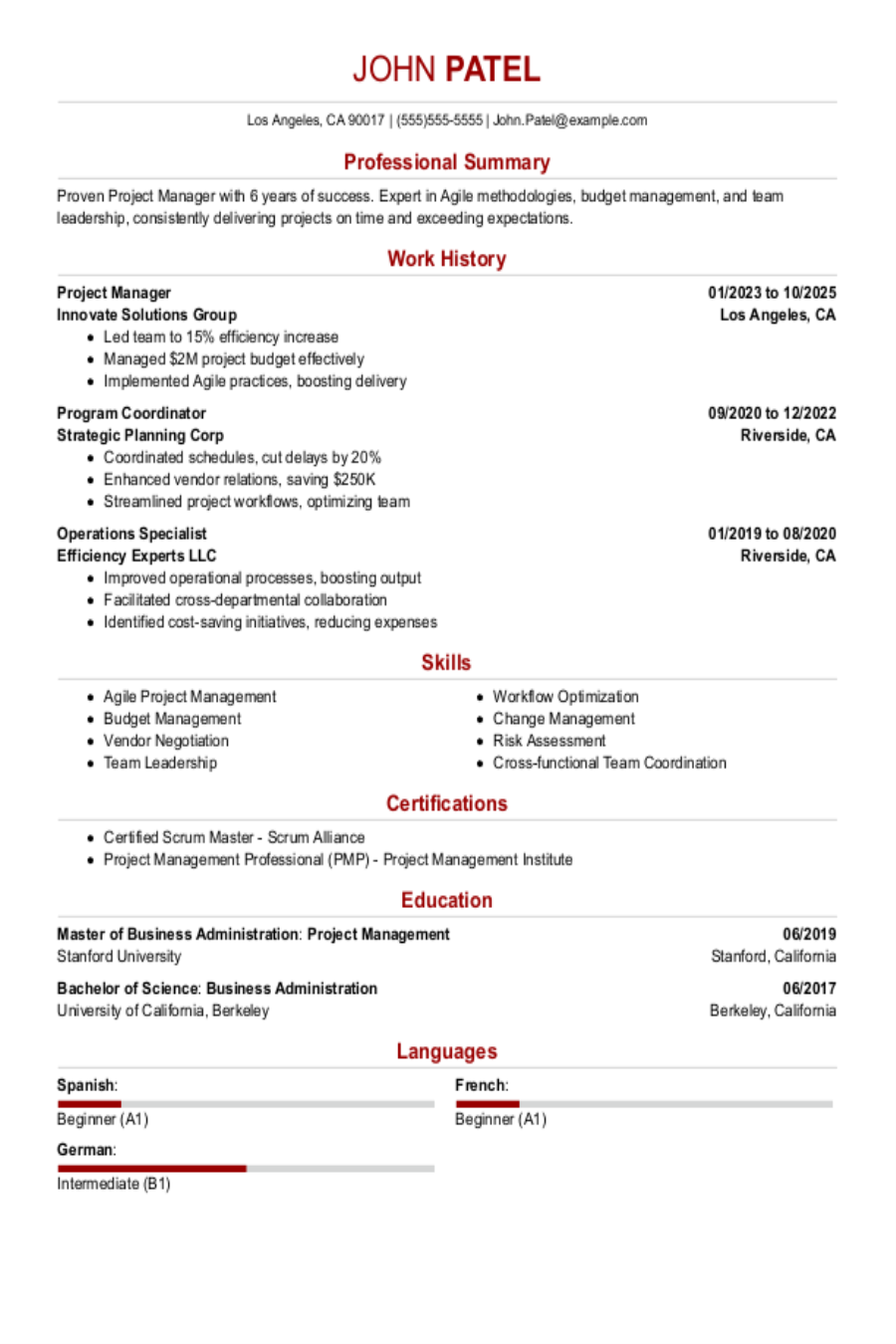Have you ever wondered why some brands become household names while others struggle to get noticed? The key to their success is marketing.
Marketing skills are the currency companies and individuals use to build brand recognition and engage with customers. When you’re looking for a job, adding them to your resume can open doors to new opportunities.
We put together this comprehensive guide to help people like you feel more confident in marketing your most important product — yourself.
Here’s what we’ll cover:
- Understanding the essential marketing skills.
- Real-world examples of marketing skills in action.
- How to put these skills on your resume.
- Additional skill sets that complement your marketing expertise.
Are you making or updating a marketing resume? Consider using a AI resume builder. These tools revolutionize the resume creation process, giving you access to a library of marketing skills and industry-specific bullet points you can add in a single click.
What are marketing skills and why are they important?
Marketing skills are the tools and techniques used to promote products, services and brands.
Common marketing skills include content creation, social media management, SEO and data analysis. Less common but still important marketing skills are influencer marketing, guerilla marketing and neuromarketing. Scroll down for a much longer list of examples.
Marketing skills are important because they help businesses reach and engage their target audience, drive sales and build brand loyalty. Not to mention, this skill set is a perfect way to butter up your resume. In fact, marketing skills have almost come to be expected in most professional roles today.
Ultimately, marketing skills are important in marketing roles, of course, but also in various other professions, from sales and customer service to product management and public relations. Better yet, this skill set is highly transferable, giving them extra value if you’re making a career transition.
Next, we’ll run through some examples.
30+ marketing skill examples to put on your resume
Marketing skills range from hard skills like data analysis and SEO to soft skills like communication and creativity. Any good marketing resume — or anyone who wants to promote their marketing abilities — would include a healthy mix of these skill sets. You need both technical proficiency and interpersonal abilities for balance.
Now, let’s look at the most common and helpful marketing skills by category.
Communication
Most of the other skills in the marketing toolbelt rest on your ability to communicate. That’s why communication skills rank as the most important skill in marketing. Effective communication helps you convey your message clearly and persuasively.
Here are a few skills to consider:
- Verbal and written communication
- Public speaking and presentation
- Interpersonal skills
- Active listening
- Negotiation and persuasion
Digital marketing
You can do wonders for your career by learning key digital marketing skills. After all, it’s 2024, and online sales continue to hit record highs.
Here are a few digital marketing skills to add to your resume:
- Social media marketing
- Search engine optimization (SEO)
- Pay-per-click (PPC) advertising
- Email marketing
- Content marketing
Data analysis
Data is about more than numbers. Analytical skills involve interpreting data to make informed decisions and understand customer behavior.
We recommend the following skills as part of any marketing toolbelt:
- Market research
- Data interpretation and reporting
- Google Analytics and other analytics tools
- A/B testing
- Excel and Google Sheets
Customer relationship management (CRM)
Looking for a unique skill to add to your resume? Consider CRM. Marketing relies on customer relationships and managing them effectively will set you apart from others in your field, especially if you have data to back up your claims.
Here are some CRM skills to put on your resume:
- Customer segmentation
- Personalization
- Loyalty programs
- Customer life cycle management
- CRM software proficiency (e.g., Salesforce, HubSpot)
Sales
Sales skills are crucial for converting leads into customers and driving revenue. Developing strong skills in this area will help you improve the overall customer experience.
Here are a few sales skills to consider:
- Lead generation
- Sales funnel management
- Negotiation tactics
- Closing techniques
- Prospecting
Project management
Project management skills are essential for planning, executing and finalizing marketing projects within scope and budget. These skills help ensure that marketing initiatives run smoothly and achieve their objectives.
Here are a few project management skills to add to your resume:
- Time management
- Budgeting
- Cross-functional team coordination
- Risk management
- Task delegation
Technical skills
Technical skills are increasingly important in the digital age. Mastering technical skills can improve your marketing efficiency and effectiveness.
Here are a few technical skills to consider:
- Marketing automation tools (e.g., HubSpot, Marketo)
- Website management (e.g., WordPress, CMS platforms)
- E-commerce platforms
- HTML/CSS basics
- Data visualization tools
How to list marketing skills on your resume
This is where the rubber meets the road, or, if you prefer, where the campaign hits its target audience.
The strength of your resume relies on how you package your skills. If you work in marketing, you know this to be true, but that doesn’t make it an easy task. Well, we’re going to make it easy for you.
Look for marketing skills in the job ad
Creating a perfect resume begins with the job listing.
Why? The job listing is your best resource for understanding what needs to be covered in your resume. Read and re-read the job description, honing in on the duties and responsibilities.
These bullet points are likely programmed as keywords in the employer’s applicant tracking systems (ATS). If you don’t include them on your resume, you might get overlooked entirely and passed over for other candidates the employer sees as more qualified.
For example, check out the job listing below, with the marketing skills in bold:
- Develop and execute comprehensive digital marketing strategies.
- Conduct thorough market research to identify new opportunities.
- Manage and optimize SEO campaigns to increase organic traffic.
- Create engaging content for various digital platforms.
- Utilize data analysis tools to track and report on campaign performance.
- Implement social media marketing initiatives to boost brand presence.
- Coordinate cross-functional teams to ensure project alignment.
- Oversee email marketing campaigns and manage subscriber lists.
- Develop pay-per-click (PPC) advertising strategies for increased visibility.
- Employ effective negotiation tactics with external partners.
Next, we’ll show you how to translate these skills onto your resume, section by section.
Beyond the job listing, check the employer’s website and mission statement to identify additional keywords and values.
Make a skills section
Every resume needs a skills section.
This is a great place to start when adding skills from the job ad onto your resume. Consider the skills section to be the headline of your resume. Without it, your resume lacks a clear summary of your qualifications.
Here’s what a skills section looks like when you incorporate marketing keywords:
- Digital marketing strategies
- Written and verbal communication
- Market research
- SEO optimization
- Teamwork
- Content creation
- Data analysis
Be sure to represent a range of skills. We advise against focusing too deeply on one area at the expense of your other skills. Try to balance a mix of hard and soft skills.
If you are brand new to the field or changing careers, a functional resume might be ideal for highlighting your transferable skills and relevant experience. Otherwise, go with a chronological resume.
Weave skills throughout your resume
Don’t stop with the skills section — use your entire resume.
First, marketing skills are clearly evident throughout your job history. Every bullet point in your previous roles is another chance to tout your skills and accomplishments.
There’s also your professional summary or objective statement. This is prime real estate, normally placed near the top of your resume, and it’s quite short — only two or three sentences. Save your most relevant skills for this paragraph.
Here’s how your professional summary might read (with the marketing skills in bold):
Results-driven marketing professional with over five years of experience in developing and executing comprehensive digital marketing strategies. Proven expertise in SEO optimization, content creation and data analysis. Adept at leading cross-functional teams and implementing successful social media marketing campaigns to enhance brand presence and drive sales.
We’ll wrap up this step-by-step guide by talking about your cover letter.
Highlight relevant skills in your education section by mentioning specific coursework, projects and certifications that align with the job requirements.
Include skills on your cover letter
Last but not least, don’t forget about your cover letter.
A well-written cover letter is like the landing page of a marketing campaign. In certain professions where creativity and writing are involved, like marketing, they can make a huge difference.
You don’t want to waste your cover letter by simply reciting the skills you listed on your resume. Instead, use the space to hone in on a few of your most salient skills, explaining how they led to successful outcomes or significant achievements in your past roles.
Or you could include marketing skills you couldn’t mention on your resume. For example, if you have experience with neuromarketing or guerrilla marketing techniques, this is the place to elaborate on those unique skills.
If you’d like more help, check out our cover letter examples. They might spark the creativity you need to write your own captivating letter.
Finally, we’ll share a list of links to other skill guides you might find helpful before we go over the final takeaways.
More skills resources
Looking for more? Check out our other skills guides:
Marketing skills — key takeaways
Understand essential marketing skills
Balance your skill set to cover a range of areas, ensuring you are well-rounded and versatile.
Analyze every job listing
Carefully read job descriptions to identify key marketing skills and responsibilities and include them on your resume.
Weave the skills throughout your resume
Highlight your skills in your professional summary, work experience and skills section.
Utilize your cover letter
Treat your cover letter as an opportunity to delve deeper into your most significant skills and accomplishments.
Was this information helpful? Let us know!
Don is a Certified Professional Resume Writer (CPRW) with more than 10 years’ experience creating digital content, including four years helping job seekers develop their careers. He holds an M.S. in Journalism from Northwestern University.
More resources
![What Should a Resume Look Like in 2025? [+ Example] What Should a Resume Look Like in 2025? [+ Example]](/sapp/uploads/2024/08/what-should-a-resume-look-like-hero.png)
What Should a Resume Look Like in 2025? [+ Example]
A good-looking resume will always use simple fonts and an easy...

25 Common Job Interview Questions and Answers for 2025
Prepare for the interview with examples of some of the most co...

5 of the Best Resume Writing Services You Can Try Today
Discover the best professional resume writing services with th...

Entry-level Resume: Examples, Templates & Tips
As you embark on your career having a standout resume is impo...

Construction Project Manager Resume Examples & Guide
As a construction project manager your resume must capture th...

Engineering Project Manager Resume Examples & Guide
As an engineering project manager your resume must capture th...
